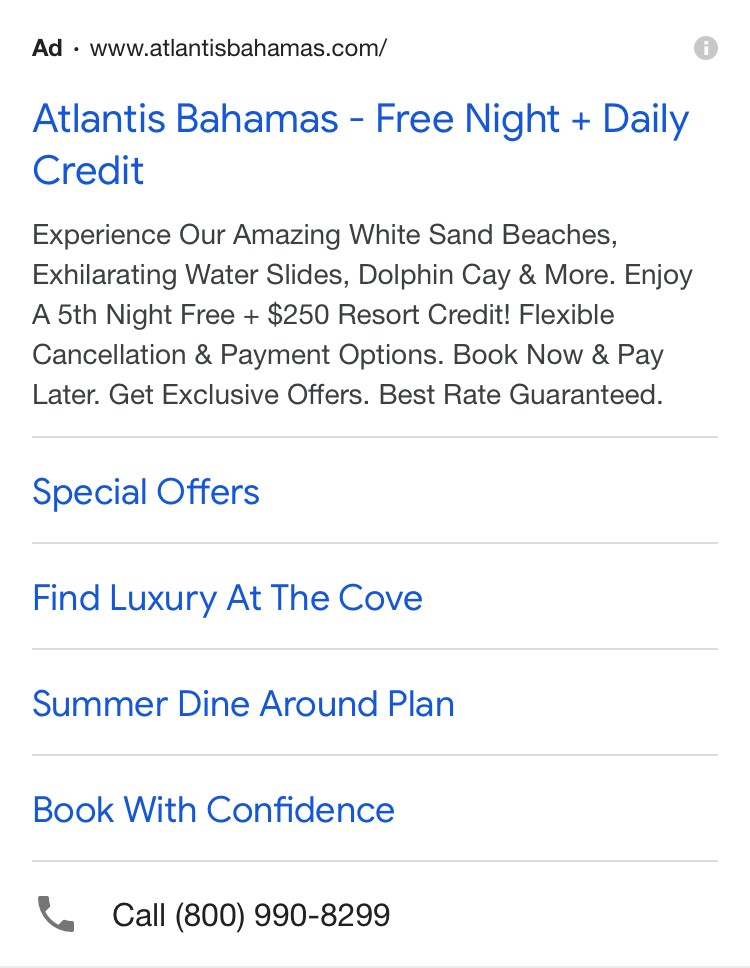Fast & Easy Mobile PPC Tips For Hotels
by Jeremy Razook
Mobile pay-per-click (Mobile PPC) ads are a great tool to help hoteliers, or advertisers in any industry, reach their customers on the go.
We are well past the mobile tipping point and having a focused mobile strategy is now an essential piece to the overall marketing puzzle.
Search engines are constantly evolving with user behavior to provide a better overall user experience. From a natural search perspective, several mobile-friendly updates have rolled out that place more emphasis on a user-friendly mobile experience.
From a paid search perspective, search engines are rolling out with more complex reporting tools to provide a cohesive picture of the cross-device customer journey so advertisers can see the impact of their mobile campaigns.
How can your hotel best leverage mobile hotel PPC opportunities? We’ve got the scoop.
Mobile Search Behavior
It is important for hotels to first consider mobile search behavior and user intent before developing a paid mobile strategy.
What are consumers searching for related to your industry when they are on a mobile device?

For hotels, this might be anything from researching destinations and accommodations at the beginning of the search funnel to quickly booking a last-minute hotel for a sudden business trip.
Hotels must have a solid understanding of where their property fits into the search funnel and how they can utilize mobile to best capitalize on searcher intent.
If someone is researching destinations, is that really the best time for your hotel to show an ad via a mobile device?
Or, if a person is researching your brand to check out your hotel before they book, would you want to be present then? Who else is bidding on these terms, and what do their ads say?
Additionally, how do people typically engage with your website via a mobile device? How is your mobile website experience? Do people typically complete a booking from their device or are they calling the property to book?
These are all questions that you will want to keep in mind when devising a mobile PPC strategy.
Mobile Keywords
It is important to note that you might not want to run mobile ads on the same keywords you run desktop ads.
Keyword testing is key to determining the best keyword set that will deliver the best return from mobile.
That may include testing mobile-focused or on-the-go campaigns like “hotels near me” or “places to stay near me”. Just remember to set a radius around your location. Doing so ensures your ads will only appear for searchers that are near your hotel.
Mobile Ad Copy
Keeping mobile searcher behavior in mind, you’ll want to create compelling mobile ad copy that will cause the searcher to act fast before they scroll.
On mobile, ads are typically truncated to just two headlines in the SERPs instead of the available three headlines. This means you’ll need to create a strong call to action using less character space in order to help users make a decision quickly.
If your property sees a higher conversion rate through phone calls, test ads that include a call extension and a clear “call now” call to action to entice action.
Better yet, you’ll want to test call-only campaigns. These campaigns utilize ads that are specifically designed to encourage searchers to call your hotel.
Similarly, if your property sees a high amount of last-minute bookings via mobile, be sure to use “last minute” specials or offers to seal the deal.
Just like desktop PPC, testing is key to finding the right ads that will resonate with your audience.
Mobile Ad Extensions

Ad extensions allow advertisers to not only showcase different unique attributes about their hotel but also allow them to take up more room on the search results page.
There are several ad extension options that work great on mobile for hotels:
App Extensions – Does your hotel have a mobile app? Prompt searchers to download your app directly with this handy extension.
Image Extensions – Use image extensions to highlight your hotel’s best qualities. Image extensions serve next to your search ads.
Call Extensions – As mentioned above, including a mobile call extension allows a searcher to click on a “call” button to reach your property directly.
Location Extensions – Location extensions show your hotel address and allow a searcher to get directions to your property.
Review Extensions – Showcase stellar reviews that your hotel has on third-party sites via the review extension.
Sitelink Extensions – Direct searchers to a specific location on your website by using up to four sitelink extensions. Examples include an amenities page, a rooms page, a specials page, or your booking engine.
Callout Extensions – Highlight amenities, offers, perks, or awards that set your hotel apart from the competition.
You can learn more about ad extensions, how to implement them, and how they work on the AdWords Support website.
Mobile Landing Pages
For most hotels, it makes sense for booking-centric ads to link to either the hotel homepage, specials page, or perhaps even the booking engine – if possible.
Or, if you are running ads for a particular special, you might even have a specific landing page set up just for that deal.
Wherever you decide to land searchers you’ll want to make sure you are providing a mobile-friendly experience.
This can be accomplished either through a responsive website or through a mobile-specific website.
Mobile Bid Adjustments
Mobile bid adjustments allow advertisers more control over their budgets.
For example, if mobile is an essential part of your overall strategy, you could apply a positive bid adjustment (example: +25%) to bid higher for selected keywords specifically on a mobile device.
Similarly, you can apply a negative adjustment to lower a bid for keywords on a mobile device.
Or if you do not want to run mobile-specific ads, you can apply a -100% bid to prevent ads from serving on mobile altogether.
Keep in mind that more than 60% of searches are now coming in via a mobile device.
It is time to take a mobile-first approach on not only your website but in all of your digital marketing efforts.